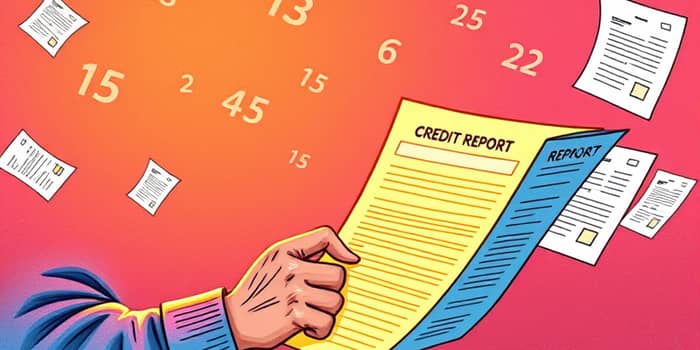
Maintaining an accurate credit report is essential for financial health and peace of mind. Errors that linger unnoticed can have lasting consequences on your borrowing power and everyday expenses. By learning to identify mistakes swiftly and taking decisive action, you ensure that your credit profile reflects your true history and opens doors to favorable terms and opportunities.
Credit reports are compiled from data provided by creditors and financial institutions. Despite robust systems, inaccuracies occur. According to a Federal Trade Commission study, about 5% of consumers discover serious errors on their credit reports, translating to roughly 10 million Americans facing elevated costs. A 2024 Consumer Reports and WorkMoney study echoed these findings, revealing that almost half of consumers found mistakes and over a quarter uncovered major inaccuracies that could derail their financial plans.
The repercussions of these mistakes extend far beyond simple inconvenience. These mistakes often translate into elevated expenses, such as high loan and insurance costs, or outright denial of credit. Errors can result in higher interest rates, loan denials, or even unexpected denials for housing or employment. These setbacks not only strain your wallet but can also undermine your confidence in the credit system.
Credit reporting errors typically arise from data entry mistakes by creditors, miscommunication during data transfers, or outdated records that creditors fail to update. Systemic issues, like batch processing errors, can lead to entire groups of files being mixed or misfiled. Moreover, identity theft remains a growing threat, with criminals opening fraudulent accounts under legitimate consumers’ information. Being aware of these root causes helps you anticipate where discrepancies might surface and prioritize your review accordingly.
Understanding the specific errors that plague credit reports empowers you to spot them more efficiently. The most frequent issues include:
By familiarizing yourself with these common pitfalls, you can approach your credit review with targeted attention and reduce the time spent sifting through irrelevant details.
Under federal law, you are entitled to one free credit report annually from each of the three major bureaus—Equifax, Experian, and TransUnion—available through AnnualCreditReport.com. Accessing these reports regularly is the cornerstone of proactive credit management.
Follow these steps to conduct a thorough review:
As you navigate through the pages, pay attention to any unexplained changes. An unanticipated drop in your score often signals an underlying error—look for unexpected drops in your credit score that coincide with new or altered account information.
When you identify a discrepancy, swift action is crucial. The Fair Credit Reporting Act (FCRA) mandates that bureaus investigate disputes within 30 days, extendable to 45 days if you provide additional documentation or if the report was accessed through AnnualCreditReport.com. After completing the investigation, they must notify you of the results within 5 business days.
Submit your dispute directly to both the credit bureau and the furnishing creditor. Include your full name, report confirmation number, a clear description of each error, and copies of supporting documents such as payment receipts or identity verification. Opting for certified mail can help preserve legal protections and provide confirmation of receipt.
For each disputed item, draft a concise cover letter that outlines exactly why the entry is incorrect and how it should be corrected. Use bullet points if necessary and reference any account numbers or dates associated with the debt. Including a photocopy of your credit report with the errors circled or highlighted can streamline the investigation. Remember, bureaus handle thousands of disputes at any given time—clear, organized submissions stand out and are processed more efficiently.
In cases where disputes yield no resolution or if corrections are only partial, you have options to escalate. First, file a complaint with the Consumer Financial Protection Bureau, detailing the unresolved issues and attaching correspondence and evidence. This federal watchdog oversees fair credit practices and can press bureaus to act.
If you suspect that a creditor is responsible for furnishing false or outdated information, you can also send them a separate dispute notice. Creditors have an obligation to investigate and correct the data they provide to bureaus. Failing to respond to a creditor dispute notice within 30 days may constitute a violation of the FCRA, giving you grounds for additional action.
For more complex or high-stakes disputes, consulting a consumer rights attorney can be invaluable. Legal professionals specializing in credit law understand the nuances of the FCRA and can guide you through filing formal lawsuits or seeking compensation for damages suffered due to persistent inaccuracies.
Maintaining an accurate credit report is an ongoing responsibility. Adopt these best practices to stay ahead:
Legislative proposals are under consideration to require more frequent free credit reports and to penalize inaccurate reporting more heavily. Staying informed on these developments can provide additional leverage when dealing with bureaus, as they may prioritize compliance amidst changing rules. Joining consumer advocacy groups or following CFPB updates helps you stay ahead of reforms that could benefit your rights as a borrower.
Recent regulatory actions underscore the importance of diligence. In January 2025, the CFPB imposed a $12 million fine on a data furnisher for reporting inaccurate information on over 300,000 consumer files. Such enforcement demonstrates that inaccuracies are not only harmful but also subject to legal scrutiny.
By understanding your rights, diligently reviewing your credit reports, and taking prompt action on discrepancies, you build a solid foundation for your financial future. Accurate credit information opens doors to lower interest rates, better loan terms, and greater confidence in your economic decisions. Take control today—your credit health is worth the effort and vigilance.
References













